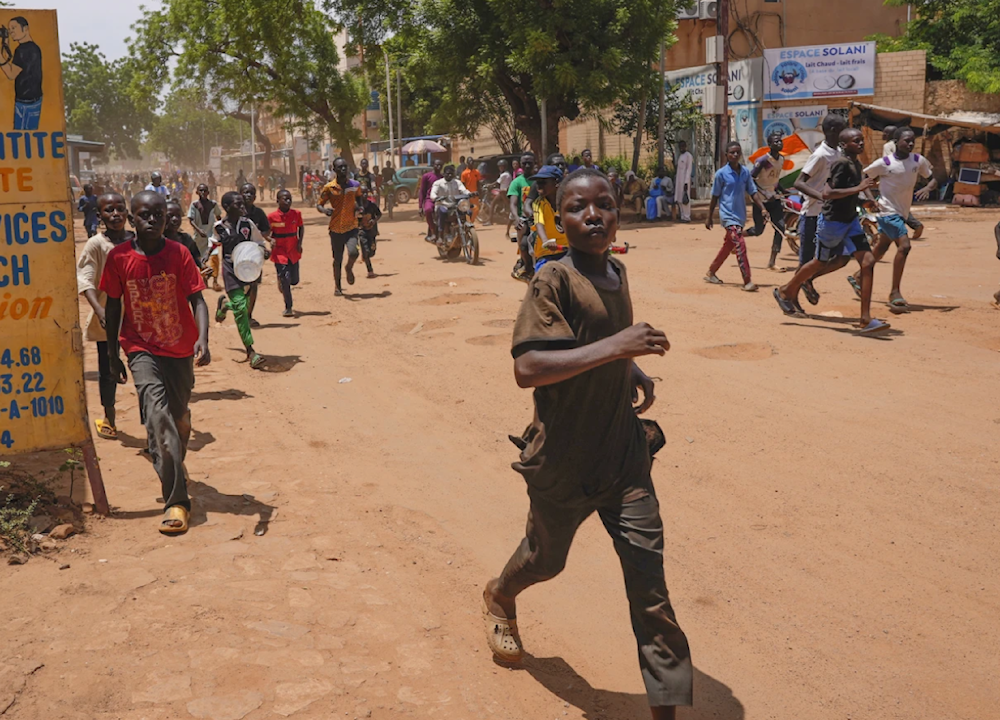Niger accuses France of financing terrorists
Niger's interim leader also accused the former head of Nigeria's National Intelligence Agency of playing a crucial role in training and supplying the Paris-backed terrorists.
-

Children run in the streets of Niamey, Niger on August 13, 2023. (AP)
General Abdourahamane Tchiani, Niger's interim leader, has accused France of aiming to destabilize the West African country and the Sahel area by sponsoring terrorist organizations in neighboring Nigeria and Benin.
In an interview with state broadcaster RTN, Tchiani said France "has poured several billion CFA francs" into armed groups such as Boko Haram, which operates in Nigeria's Sokoto, Zamfara, and Kebbi states, as well as in Benin.
He also accused Ahmed Abubakar Rufai, the former head of Nigeria's National Intelligence Agency, of playing a crucial role in training and supplying the Paris-backed terrorists.
‘‘In Nigeria… Ahmed Abubakar Rufai… was the focal point for training, acquisition of equipment, and financing related to terrorism,” according to Tchiani.
A statement issued by Nigerian government spokesperson Mohammed Idris Malagi on Friday detailed how “Nigeria and Niger are related by history, culture, commerce and marriage. Nigeria has never and will never be interested in the destabilization of Niger."
"We urge Tchiani and the Niger junta to stop trying to create confusion, and stop trying to drive a wedge between Nigerians and Nigeriens," he stated.
Relations between Niger and France have worsened since General Tchiani launched a coup that deposed Mohamed Bazoum, the country's pro-Western government, in July 2023. This change of events has strained relations between the Sahel nation and its West African neighbors, with the exception of Burkina Faso and Mali, both of which are under military administration following coups by anti-imperialist forces.
The Economic Community of West African States threatened to use force against the coup leaders, and many of Niger's neighbors, notably Nigeria, the regional bloc's current chairman, expressed willingness to send soldiers to the Paris-backed operation.
On Wednesday, Niger's interim leader said rampant militant violence in the nation was the reason they ousted Bazoum , claiming that he had "received terrorists several times at the Presidential Palace," and detailed how these authorities acted "under the injunction of France, this same France, I say it and I repeat it, which finances terrorism in the Sahel."
The military-led governments of Mali, Burkina Faso, and Niger convened their first joint summit on July 7 in Niamey and have broken defense links with former allies, notably France and the United States.
Burkina Faso, Mali, Niger accuse Ukraine of backing terrorism in Sahel
Back in August, Burkina Faso, Mali, and Niger formally urged the UN Security Council president to condemn what they described as Ukraine’s “blatant and deliberate support for international terrorism,” specifically in Africa’s Sahel region.
The request comes after recent remarks by Ukrainian officials hinting that Kiev may have supported Tuareg separatist rebels involved in deadly attacks on Malian soldiers in the northeastern village of Tinzawaten, near the Algerian border.
In a joint letter, the foreign ministers of Burkina Faso, Mali, and Niger expressed shock over remarks made by Andriy Yusov, a spokesperson for the Ukrainian military intelligence, who “admitted Ukraine's involvement in the cowardly, barbaric, and criminal attacks” that took place between July 24 and 26.
It added that the remarks were confirmed by Yurii Pyvovarov, Ukraine’s ambassador to Senegal.
The letter called on the Security Council to “take appropriate measures against these subversive actions which strengthen terrorist groups in Africa," adding that the official’s remarks exceed mere foreign interference, which is condemnable in its own right.
Earlier in August, the Malian interim government announced it was cutting off its diplomatic relations with Ukraine following Kiev's involvement in a recent terrorist attack that killed Malian soldiers and Russian military contractors in support of the Tuareg militants.
Ukrainian military intelligence service spokesperson (GUR) Andrey Yusov stated on national television that his agents assisted the militants with “necessary information, and not just information, which enabled a successful military operation against Russian war criminals,” pledging that “there will be more to come.”

 4 Min Read
4 Min Read








